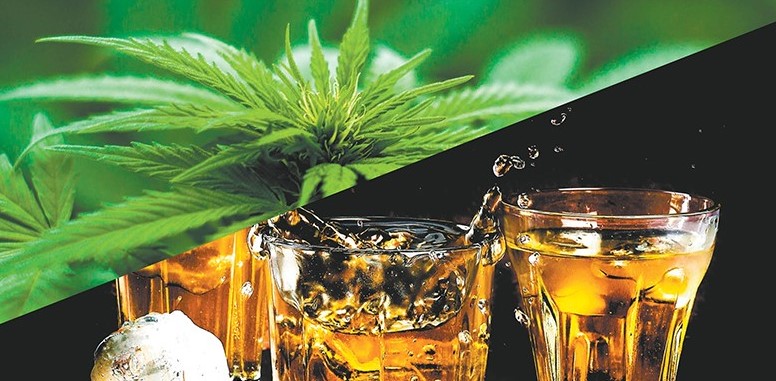Uncategorized
Crossfading: What Really Happens When You Mix Alcohol and Weed?
Thanks to increasing legalisation, marijuana isn’t a drug you hide from others any more. Alcohol, like marijuana, has the ability to make you feel relaxed, eliminate social inhibitions, and cause you to feel absolutely giddy.
The dopamine reward system is a target that both alcohol and cannabis affect similarly. Dopamine boosts the pleasurable drug experience and encourages repeat behavior, according to Joseph R. Volpicelli, medical director of the Volpicelli Center in Pennsylvania. As a result, it shouldn’t come as a surprise that combining drinking and smoking, otherwise known as crossfading, is quite popular.
When it comes to health and safety, are you creating yourself a problem by mixing cannabis with other drugs or enhancing your drug experience? According to science, the answer is whether or not you crossfade frequently and which drug you use first.

Booze Before Weed
According to James Giordano, a professor of neurology and biochemistry at Georgetown University Medical Center, if you drink alcohol before smoking weed, you will get higher than if you just smoked weed by itself. “Booze before weed gets you higher indeed,” Giordano explains. Any type of alcohol—whether it be wine, beer or a shot—causes THC in cannabis products to be absorbed more easily by priming liver enzymes.
Alcohol also impacts how other areas of the body absorb THC. Dr. Volpicelli explains, “Alcohol relaxes smooth muscle, so the arteries relax too. This then increases blood flow to many parts of the body. When you inhale marijuana, it crosses over from the lung and enters directly into the bloodstream rather than passing through first.” In other words, because there is more blood flowing to the lungs when alcohol is present in your system, marijuana gets absorbed at a quicker rate.
Giordano believes that drinking before smoking may also make it simpler for drugs to enter the brain — although more research is required. A 2020 study in Frontiers in Neuroscience discovered that consuming too much alcohol or being dependent on alcohol could weaken the blood-brain barrier, which prevents harmful chemicals or drugs from entering the brain.
If you’re new to cannabis, be wary of over doing it by combining alcohol and cannabis. Although for experienced users, mixing the two might enhancing the experience, novice smokers might find themselves feeling nauseous or unwell.
Giordano says that “greening out” occurs when a person feels sick after consuming too much pot. This happens because cannabinoid receptors in the brain become flooded with THC, causing a system overload and mild toxicity effect. While not life-threatening, it is nonetheless an unpleasant experience. Your body will switch back and forth between the parasympathetic and sympathetic nervous system, resulting in chills, cold sweats, nausea, dizziness and repeated vomiting. Giordano’s advice: start slow and start low to avoid this altogether. And if you’re unsure or at all worried about it happening to you, make sure you have access to a bathroom just in case.

Weed Before Booze
“If you smoke marijuana before drinking, you’ll have more than you realize,” warns Giordano. THC slows the rate at which alcohol is absorbed into your gastrointestinal system. Alcohol can also alter brain function, making it more difficult to determine if you had too much to drink.
During an interview with Verge, Joe Giordano, the owner of High Plains Marijuana Company in Colorado Springs, CO, explains that if you want to smoke first, you should drink less than usual because of alcohol’s delayed effect. “If two drinks get your buzz on, three drinks get you loaded then four drinks may get you plastered. But if you have weed aboard, two drinks do nothing and three drinks will only give you a modest buzz. “You’ll still become intoxicated on the third and fourth drink; it’ll just strike you later,” he says.
Short-term health effects
Experts believe that marijuana and alcohol can be consumed safely when individuals use precautions to control risk. One approach is to stay hydrated.
Alcohol’s role as a diuretic increases the risk for dehydration. Throw in some pot and your risk of dehydration increases, especially if you vomit during a green out. Vice versa, using weed before drinking delays the effects of alcohol, potentially leading you to drink more than you should. The increased alcohol intake increases the risk for toxicity.
If you smoke first, the likelihood of vomiting is extremely small because marijuana also functions as an antiemetic. “The ability to purge is reduced, which can lead to toxicity issues when it comes to getting rid of the alcohol,” Giordano adds.
Volpicelli explains that not drinking alcohol in excess when crossfading could potentially help. He says that cannabis use can make short-term memory worse, however chronic marijuana smokers have less of this effect because their body becomes used to it overtime. However, adding alcohol back into the mix can cause the cognitive deficits associated with marijuana use to return and become even worse.

Long-term health effects
Excessive drinking, on its own, raises the likelihood of alcohol addiction or alcoholism, as well as liver and kidney damage, heart problems, cognitive impairment, and other illnesses. According to Volpicelli, women are more vulnerable than males to the physical side effects of alcohol.
If you use cannabis excessively, though, it comes with its own issues like tolerance and dependence. With a higher tolerance, you might begin taking larger doses which can be unsafe. If smoking marijuana is your chosen method, know that there’s always lung damage risks over time according to the American Lung Association. They state this is because smokers inhale more deeply and hold their breath for longer periods than cigarette smokers do.
Though marijuana’s long-term effects on humans are largely unstudied, some scientists fear that crossfading–the act of using multiple drugs simultaneously or in close succession– could have negative consequences. A 2019 study published in Substance Use & Misuse did find increased risk for drug use among college students who reported frequently crossfading, but researcher argues that street products’ varying levels of concentration make self-reported accounts unreliable.
According to Giordano, studying the health effects of marijuana may be easier if it were legalized because users would then have access to higher quality, purer strains from reputable distributors. “We better understand cigarettes’ health impact after years of thorough research and longitudinal studies,” he says.
Cannabis has been shown to help with a variety of health concerns in recent years. Cannabidiol, a cannabinoid found in cannabis, was discovered in an animal study published in Free Radical Biology and Medicine in 2015 to protect the liver from binge drinking-induced damage. “We don’t have much research yet, but marijuana’s anti-inflammatory properties were demonstrated in animal studies,” Volpicelli adds. “Marijuana has the potential to be beneficial for suppressing chronic liver inflammation and long-term liver disease.”
In other words, if you’re a heavy drug user or just thinking about trying drugs for the first time, it’s better to go slow and start with small doses. This way, you can get to know how your body reacts and be prepared for any consequences.


